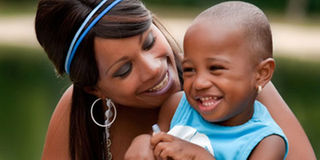Ten habits that harm your child’s health

Most of us are constantly looking for ways to ensure that our children are healthy. PHOTO|FILE| NATION MEDIA GROUP
What you need to know:
- When most urban children are not studying, they spend a lot of their time watching television or on the computer.
Most of us are constantly looking for ways to ensure that our children are healthy. We take them for regular check-ups, ensure that they get all their vaccinations on time and try and give them the best available foods. However, some of their day-to-day habits (and ours too!) are negatively affecting their physical and mental health.
TOO LITTLE SUNSHINE
We are lucky to live in the tropics but few children spend sufficient time outside in the sun yet this is crucial for helping the body make vitamin D which is needed for healthy bones. (Vitamin D and calcium go hand-in-hand in building strong bones).
Lack of vitamin D/calcium leads to bone deformities in children (including bow legs, abnormal chest and skull shape) and causes them to fracture/break easily. Exposure to sunshine should start in infancy and continue throughout life.
TOO LITTLE EXERCISE
Our academic programme has a very broad syllabus and is very competitive. Most children above the age of 10 spend most of their time studying – with very little time set aside for play and extra-curricular activities. When most urban children are not studying, they spend a lot of their time watching television or on the computer.
This sedentary lifestyle not only sets them up for obesity, it also is unhealthy for their bones which need exercise in order to become stronger.
Weak bones in children as pointed out earlier can lead to easy breakage and deformity.
BAD PARENTAL HABITS
Children pick up most of their lifelong habits from the adults they interact with daily. For this reason, it is inevitable that some of the bad habits children have, they get from their parents.
Most of these can, however, be avoided if we just took time to keep our words/actions in check.
TOO MUCH TV/COMPUTER
Children in urban areas watch too much television compared to their rural counterparts. The television is often a ‘baby sitter’ for the child.
It becomes a crucial part of their lives and most would rather watch television than go out and play. As the child grows older, computers are incorporated into their lives.
Although both television and computers are great innovations, if utilised in excess they not only promote a sedentary lifestyle but can also give eye problems (usually eye strain. In fact, excess computer usage has been known to give a complex set of eye problems known as ‘computer vision syndrome’).
COMFORT FEEDING
When babies are unhappy, most mothers automatically try and breastfeed the child to soothe them. However, this feeding habit needs to be weaned out as the child grows older.
Offering a child a snack or meal each time they are unhappy (regardless of whether or not they are hungry) is a dangerous precedent as it sets the child up to become a ‘comfort eater’.
Such eaters tend to binge on food when they are unhappy and most often end up battling obesity throughout their lives.
SLEEPING WITH THE BOTTLE
Some children get used to sleeping with a bottle of either milk or juice in their mouths. This habit often comes from infancy when they are put to sleep while breastfeeding.
With infants, sleeping with a bottle (or while breastfeeding) is not considered a major problem as long as one takes precautions to ensure that the baby does not choke.
For older children, however, this habit can lead to early tooth decay and is often discouraged by dentists.
PENCIL OR THUMB IN MOUTH
Some children love to gnaw and nibble at the end of their pencil as they work. Others take comfort in sucking their thumbs.
These two habits should be discouraged as they are harmful to the teeth. They are particularly affect alignment of the teeth.
MARITAL RELATIONSHIP ISSUES
Most children learn how to treat people of the opposite sex (including their future spouse) from watching how their parents relate.
If a child grows up in an environment in which there is violence and constant bickering the child will pick up on this and it will negatively affect the way they interact with other people.
Some try and avoid people of the opposite sex while others develop a sense of disrespect and disillusionment about them.
For this reason, mental health experts discourage constant bickering and putting each other down during arguments in front of the children. You often don’t notice it, but the child is always affected in these situations.
POOR COPING MECHANISMS
If each time you are stressed you tell your child that you need an alcoholic drink or a cigarette or food to cope with the situation, your child will instantly associate those habits with comfort (coping mechanism).
You will find that most of these children turn to these same coping mechanisms once they reach teenage and early adult years.
SELF-CRITICISM
Most children learn how to view themselves as individuals from observing those around them – especially their parents. If a child constantly sees you criticise yourself, they can subconsciously develop the same habit. For example, children do not have body image problems.
However, if a girl constantly listens to her mother berate herself about the appearance of her body, that girl will almost inevitably do the same as she grows older.
This article was first published in the Business Daily.




